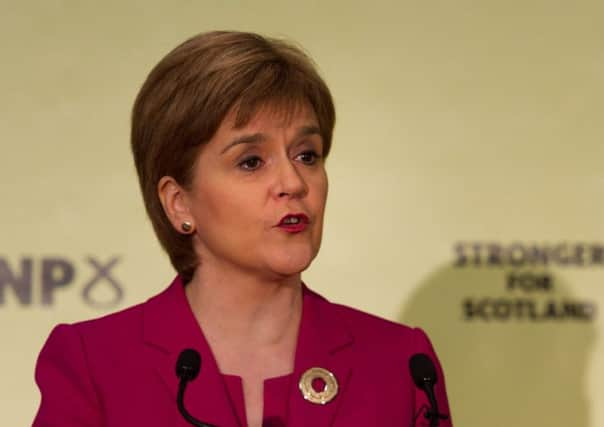Nicola Sturgeon demands UK action on refugee crisis


The First Minister demanded “immediate” action from the UK Government during face-to-face talks with Foreign Secretary Philip Hammond yesterday which could see the first refugees arriving north of the Border in weeks.
Ms Sturgeon led a three-pronged offensive from SNP ministers yesterday for the UK to play a greater role in the EU-wide effort to address the biggest refugee crisis since the Second World War.
Advertisement
Hide AdAdvertisement
Hide AdDavid Cameron has pledged to accept 20,000 refugees over the next five years from camps on the Syrian border. But the SNP leader, who has previously said she would accept refugees in her own home, wants greater urgency from the UK Government.
Scotland will accept its “fair share” and this would mean about 2,000 - twice the previous “minimum” figure of 1,000 set out by the First Minister. Deputy First Minister John Swinney yesterday told EU chiefs that Scotland was ready to take part in a European-wide co-ordinated action during a keynote speech in Brussels, although EU leaders are still split on how to deal with the crisis.
Scotland’s international development minister Humza Yousaf also set out the practical action being put in place in Scotland in a meeting with the UK’s new refugee minister.
Ms Sturgeon said: “Scotland has a strong track record in welcoming those who have been forced to flee their homes due to war or persecution and we stand ready to help as many people as we can in the current crisis.
“While I welcome the UK Government’s commitment to take in more refugees and pledge more aid, it is clear from the distressing scenes we continue to witness in Europe that we need to extend immediate help to more people and look to assist those already here. We cannot ignore those in need on our doorstep and I believe the UK should opt in to the extended EU-wide relocation scheme announced by the EU President recently.
“I was able to make that case to the Foreign Secretary today, and restate my commitment that Scotland will take in a fair share of those who arrive in the UK looking for refuge.”
The Scottish Government has already set up a humanitarian taskforce to take forward the practical response on the ground and is due to meet again today.
Mr Yousaf, the minister responsible for the taskforce, met the new UK minister for refugees Richard Harrington.
Advertisement
Hide AdAdvertisement
Hide Ad“While Mr Yousaf and I made our case directly to the UK Government, the Deputy First Minister was in Brussels where he outlined Scotland’s desire to participate in the EU-wide co-ordinated action on refugees that I believe is so desperately needed.”
The First Minister told MSPs earlier this year how she had been moved to tears by the image of dead Syrian toddler Aylan Kurdi being carried from a beach in Turkey.
And she added last night: “People understand that a humanitarian crisis on this scale will not just go away because countries bury their heads in the sand and refuse to deal with it - nor will it be dealt with by one or two countries trying to do it on their own. We all need to come together and deal with it collectively.”
Mr Cameron is to discuss the plight of the refugees fleeing the civil war in Syria when he meets French President Francois Hollande ahead of an emergency EU summit tomorrow to discuss the crisis.
But he has refused to sign up to a Franco-German plan for a quota system to distribute tens of thousands of refugees currently in the EU among the member states.
Mr Cameron has consistently argued it is better to provide support for the refugees in the region rather than encouraging them to make the dangerous sea crossing to Europe by offering the prospect of re-settlement in the EU.
While Britain has said that it will re-settle 20,000 of the most vulnerable refugees over the next five years, it will take them direct from the refugee camps bordering Syria rather than from among those who have already made it to Europe. Mr Cameron’s spokeswoman said that he would use tomorrow’s summit to urge EU leaders to do more in the region - including tackling the people-smuggling gangs behind much of the influx.
She said that the UK also believed that there needed to be a proper process for assessing claims for asylum by migrants, with those who were not entitled to refugee status being returned to their country of origin.
Advertisement
Hide AdAdvertisement
Hide Ad“Where those claims are not accepted and agreed, we do think the European countries need to be looking at what is the process of returns and removing those people,” she said.
EU leaders will make a fresh attempt this week to agree on a quota system amid deepening divisions between western and eastern Europe countries over the issue.
Hungarian Prime Minister Viktor Orban last night called the mass migration of thousands of refugees a “brutal threat” to Europe.
He added refugee relocation quotas put forward from the European Parliament are not a “European action plan”.
The foreign ministers of the Czech Republic, Hungary, Poland, Slovakia, Romania and Latvia kicked off the week of intense diplomatic activity with talks yesterday, as the crisis has exposed deep division among European states.
The eastern European nations are expected to reiterate their opposition to the idea of EU-wide quotas for accepting refugees. The head of the European Parliament hopes that EU member states can reach an agreement on relocating 160,000 people.
Martin Schulz, President of the EU parliament, said: “There will be some discussions, but at the end there will be an agreement on the relocation of the 160,000 (migrants)”.
Foreign ministers from the 28 member states will be present at the emergency summit tomorrow.